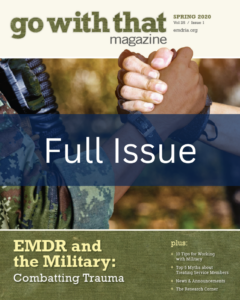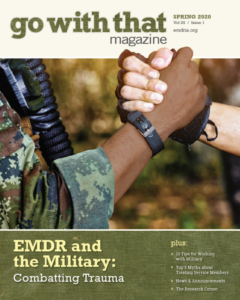Exposure-related cortisol predicts outcome of psychotherapy in veterans with treatment-resistant posttraumatic stress disorder (Journal of Psychiatric Research)
This study investigated cortisol levels in veterans with treatment-resistant PTSD over the course of 3MDR exposure therapy and aimed to determine whether cortisol levels were related to changes in PTSD symptom severity.
Read MorePerceived treatment processes and effects of interactive motion-assisted exposure therapy for veterans with treament-resistant posttraumatic stress disorder: A mixed methods study (European Journal of Psychotraumatology)
This study looks at the perspectives of veterans with treatment-resistant PTSD on 3MDR treatment processes and explores the relation of their experiences to PTSD symptom improvement.
Read MoreTrauma, treatment and Tetris: video gaming increases hippocampal volume in male patients with combat-related posttraumatic stress disorder (Journal of Psychiatry & Neuroscience)
A neuroimaging study to assess Tetris in patients with existing PTSD or explored how playing Tetris may affect brain structure.
Read MoreThe Scientific Status of EMDR Therapy for Combat-Related PTSD
The Scientific Status of EMDR Therapy for Combat-Related PTSD
Read MoreEMDR and the Military: Combating Trauma (Go With That Magazine Issue)
In the Spring 2020 issue of Go With That Magazine we look at how EMDR therapy can help service members or veterans work through many types of combat trauma or PTSD.
Read MoreA Range of Service Trauma: Considering More than Combat
Beyond Combat Trauma: Exploring Varied Service-Related Trauma. Uncover the range of traumas faced by service members.
Read MorePerspectives: An EMDR Clinician’s Encounter with Military Professional Settings
Exploring EMDR in Military Settings: Insights from a Clinician’s Perspective. Unveil the roles of therapists in serving veterans and military personnel.
Read MoreMilitary Cultural Competence
Embracing Military Cultural Competence: Understanding Its Significance. Explore the integrated perspective in military culture.
Read MorePerspectives: A Journey to Building a Heart for Working with Military
Fostering Connection with Military: A Personal Path Unveiled. Explore a clinician’s unexpected journey into working with service members.
Read MoreDrivers of preference for evidence-based PTSD treatment: A qualitative assessment (Military Medicine)
This project analyzes the reasons that drive preferences for one of five evidence-based PTSD treatments (cognitive processing therapy, prolonged exposure, eye movement desensitization and reprocessing, stress inoculation training, antidepressant medication) among adults who screened positive for PTSD.
Read MoreIndividual prediction of psychotherapy outcome in posttraumatic stress disorder using neuroimaging data (Translational Psychiatry)
This study investigated how functional magnetic resonance imaging (MRI/rs-fMRI) data could create personalized treatment for PTSD by studying a group of male veterans..
Read More




